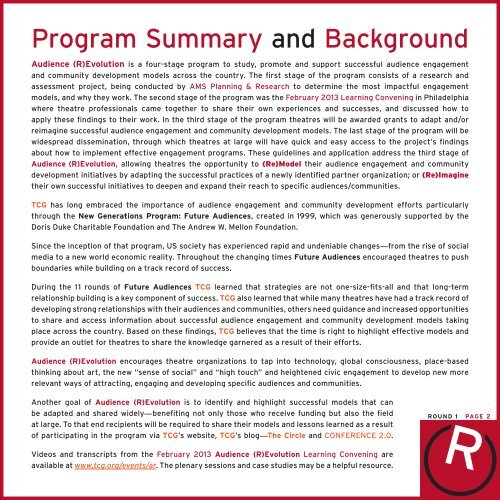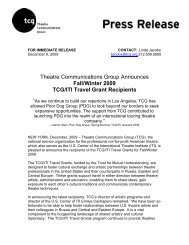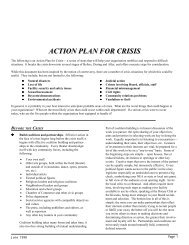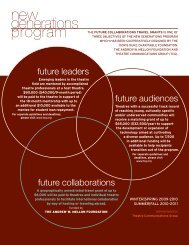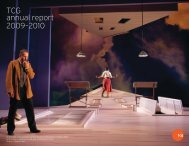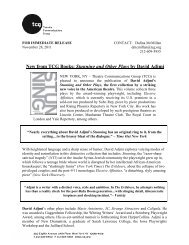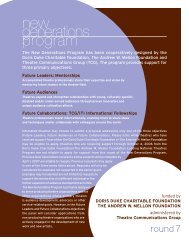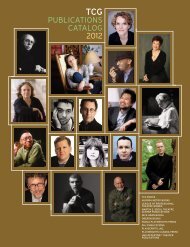Round 1 Guidelines - Theatre Communications Group
Round 1 Guidelines - Theatre Communications Group
Round 1 Guidelines - Theatre Communications Group
You also want an ePaper? Increase the reach of your titles
YUMPU automatically turns print PDFs into web optimized ePapers that Google loves.
Program Summary and Background<br />
Audience (R)Evolution is a four-stage program to study, promote and support successful audience engagement<br />
and community development models across the country. The first stage of the program consists of a research and<br />
assessment project, being conducted by AMS Planning & Research to determine the most impactful engagement<br />
models, and why they work. The second stage of the program was the February 2013 Learning Convening in Philadelphia<br />
where theatre professionals came together to share their own experiences and successes, and discussed how to<br />
apply these findings to their work. In the third stage of the program theatres will be awarded grants to adapt and/or<br />
reimagine successful audience engagement and community development models. The last stage of the program will be<br />
widespread dissemination, through which theatres at large will have quick and easy access to the project’s findings<br />
about how to implement effective engagement programs. These guidelines and application address the third stage of<br />
Audience (R)Evolution, allowing theatres the opportunity to (Re)Model their audience engagement and community<br />
development initiatives by adapting the successful practices of a newly identified partner organization; or (Re)Imagine<br />
their own successful initiatives to deepen and expand their reach to specific audiences/communities.<br />
TCG has long embraced the importance of audience engagement and community development efforts particularly<br />
through the New Generations Program: Future Audiences, created in 1999, which was generously supported by the<br />
Doris Duke Charitable Foundation and The Andrew W. Mellon Foundation.<br />
Since the inception of that program, US society has experienced rapid and undeniable changes—from the rise of social<br />
media to a new world economic reality. Throughout the changing times Future Audiences encouraged theatres to push<br />
boundaries while building on a track record of success.<br />
During the 11 rounds of Future Audiences TCG learned that strategies are not one-size-fits-all and that long-term<br />
relationship building is a key component of success. TCG also learned that while many theatres have had a track record of<br />
developing strong relationships with their audiences and communities, others need guidance and increased opportunities<br />
to share and access information about successful audience engagement and community development models taking<br />
place across the country. Based on these findings, TCG believes that the time is right to highlight effective models and<br />
provide an outlet for theatres to share the knowledge garnered as a result of their efforts.<br />
Audience (R)Evolution encourages theatre organizations to tap into technology, global consciousness, place-based<br />
thinking about art, the new “sense of social” and “high touch” and heightened civic engagement to develop new more<br />
relevant ways of attracting, engaging and developing specific audiences and communities.<br />
Another goal of Audience (R)Evolution is to identify and highlight successful models that can<br />
be adapted and shared widely—benefiting not only those who receive funding but also the field<br />
at large. To that end recipients will be required to share their models and lessons learned as a result<br />
of participating in the program via TCG’s website, TCG’s blog—The Circle and Conference 2.0.<br />
ROUND 1 PAGE 2<br />
Videos and transcripts from the February 2013 Audience (R)Evolution Learning Convening are<br />
available at www.tcg.org/events/ar. The plenary sessions and case studies may be a helpful resource.


